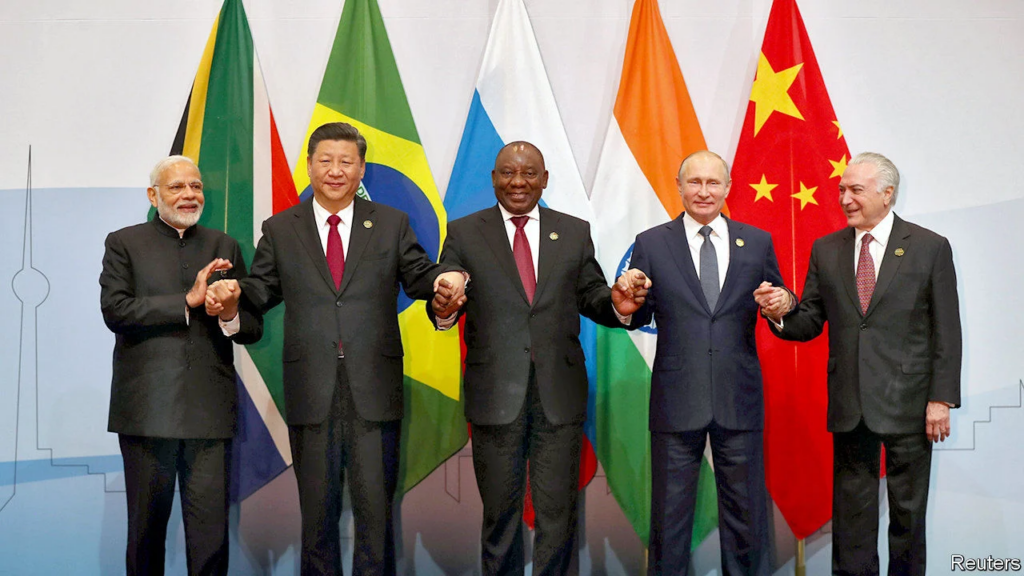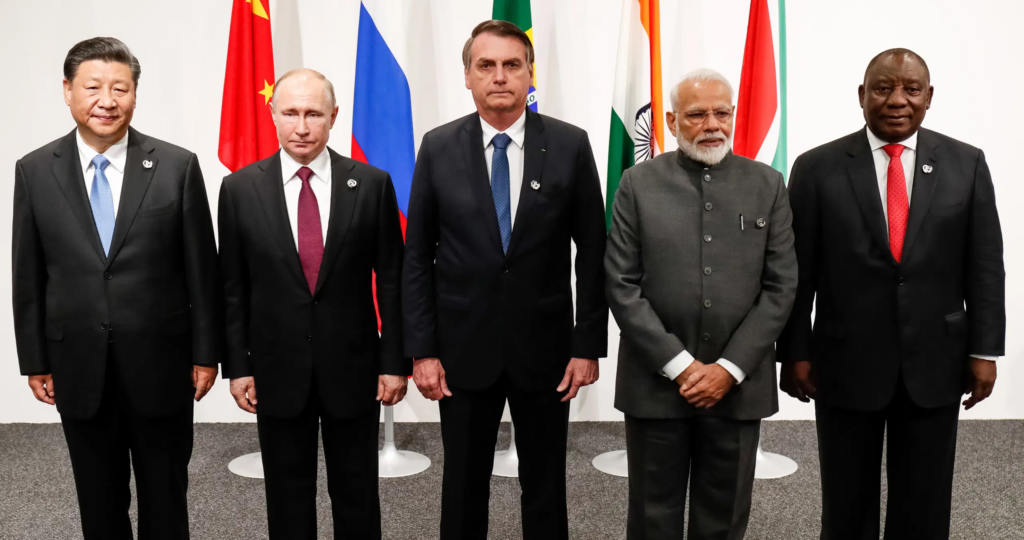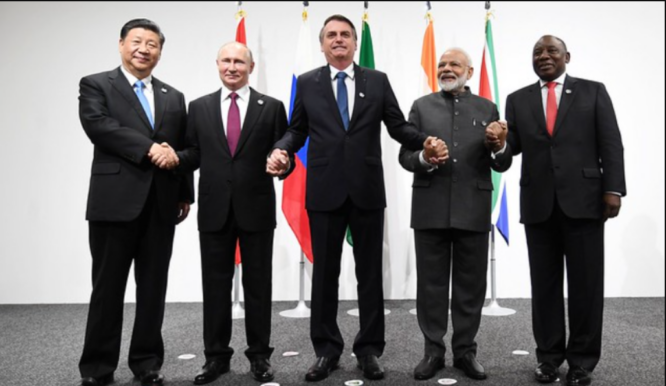BRICS foreign ministers will meet in South Africa on June 1-2 to discuss geopolitical issues, including the bloc’s first enlargement in over a decade, as it seeks to represent the “Global South” and offer an alternative to the Group of Seven.
In an exclusive interview, South Africa’s ambassador to BRICS, Anil Sooklal, said the top diplomats of Brazil, Russia, India, China, and South Africa will discuss at least 20 countries’ formal and informal membership applications and future enlargement at their summit in Cape Town.
China, which led the group last year, advocated expanding representation from Africa, Latin America, the Middle East, and Asia, including Egypt, Nigeria, Mexico, Iran, Indonesia, Turkey, and others.
Sooklal added, “This is positive news for the bloc, as it demonstrates the confidence of the Global South in the leadership of our group.” The meetings will also focus on increasing local currency commerce.

About 100 developing nations form the Global South.
Sooklal said the BRICS is seeking to establish a “more inclusive” international order that “addresses the existing fault lines on the global, geopolitical, geoeconomic and financial architecture.” Most of them are still sidelined in global decision-making.
“These countries want a greater say in the evolving global architecture,” the envoy stated. “They want a multipolar, multicultural, multi-civilizational world that is not dominated by one or two hegemons and where they have more independence and choices to determine what’s in their best interest.”
According to Ryan Berg, director of the Americas Program at CSIS, Russia’s invasion of Ukraine has made the BRICS more relevant, especially for Global South countries that want to resist the West’s “autocracy-vs-democracy” narrative.
He noted that multilateral bodies that bring together Global South nations can balance the urge to align with the US or China on specific problems and retain a limited policy autonomy for many of them.
Most nations wishing to join the transregional BRICS are not G7 enemies and do not reject the liberal international order. They simply want to hedge their risks in an increasingly uncertain geopolitical and geoeconomic landscape.
Sebastian Maslow, a Sendai Shirayuri Women’s College instructor, said the rising involvement with global frameworks shows that power and national interest are rapidly diversifying.
He noted that G7 members like India and Brazil attended summits last year and recently in Hiroshima, indicating that they recognize this competition over the Global South. If expanded, the BRICS grouping is expected to provide other emerging economies with a platform to advocate their interests and coordinate action.
Maslow added that adding more members alone will not enable BRICS to counteract the U.S.-led world order or challenge international norms and values. He noted that the grouping must first present an alternative that legitimately undermines the benefits of the current system.
However, economic growth, a primary priority in Global South countries, is the group’s goal.
BRICS countries typically prioritized development above the G7. Experts suggest they are more flexible on governance methods, which might mean different economic and financial norms, regulations, and practices.
Former White House official Joe Sullivan, now with The Lindsey Group, an economic advising business, said this focus is because Global South countries see the International Monetary Fund and World Bank as not representing them.

Sullivan noted that the projected expansion will offer BRICS greater influence and legitimacy as an alternative to Western-led organizations.
“With credibility comes bargaining power,”
BRICS initiatives, such as the New Development Bank (NDB), may provide these nations more flexible funding than the IMF or World Bank.
Stefanie Kam, a research fellow at the S. Rajaratnam School of International Studies in Singapore, said the BRICS group wants to help these nations collaborate on economic and development challenges rather than political and security issues.
Kam noted that Chinese wealth, particularly in extractive, infrastructure, and commerce sectors, is dictating growth in many of these nations.
Emerging countries are seeking alternate sources of money amid worries about the sustainability and trustworthiness of the West’s pivot to Asia, which some see as driven by Beijing’s expanding international influence.
Acorn Macro Consulting, a U.K.-based economic research firm, reported earlier this year that the BRICS members now account for 31.5% of global GDP (PPP), surpassing the G7’s 30.7%.
If additional nations join the BRICS, that gap and their economic power are projected to widen this year. The organization realizes it needs lessen its reliance on the U.S. dollar to offer itself as an alternative economic growth model.
According to Berg, BRICS members want a non-dollar-denominated world to have more policy autonomy. India has rupee payment arrangements with at least 18 nations, including Russia.
Brazil and Argentina have struck currency exchange accords with Beijing to trade in Chinese yuan to lower trade costs and decrease vulnerability to U.S. dollar swings.
In April, ex-Brazilian President Dilma Rousseff, the NDB’s leader, said that at least 30% of loans will be in member nations’ native currencies.
“Financial independence and sovereignty,” Sooklal stated. “These countries want more investment, trade, and financing determination. He continued, “They’re not tied to a currency or financial institution.”
Perhaps more crucially, BRICS countries realize that the dollar-based payment system makes them vulnerable to U.S. sanctions. After Russia was sanctioned for its invasion of Ukraine, Moscow and Beijing greatly boosted local currency transactions.
China, in an escalating geopolitical confrontation with Washington, must reduce dependency to internationalize the yuan and limit the impact of U.S. sanctions on the world’s second biggest economy.
Ian Chong, a political science professor at the National University of Singapore, suggested using another currency for transactions. He said that long-term monetary stability is crucial to its success.
South Africa joined BRICS in 2011, the only expansion since 2006.
Current members have diverse motives for wanting new members. Maslow said China might utilize a larger BRICS group to push new global standards that support its Belt and Road program, as well as the yuan.
The expert said Russia could use the group to show its citizens and the world that Moscow is not isolated despite Western sanctions, while India could use it to strengthen its role as leader of the Global South and keep China in check through multilateral engagement.
However, enormous obstacles are ahead. Enlarging BRICS would show its popularity, but it might dilute membership benefits.
The bloc’s growing variety in political and economic systems may make consensus on important issues harder than in the democratic G7.
The group’s leaders will likely debate these problems during their annual summit in August.

